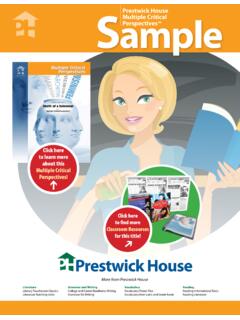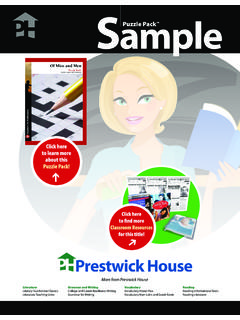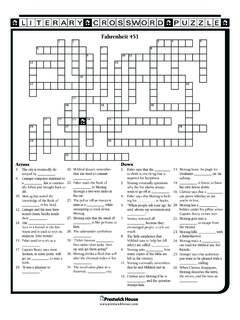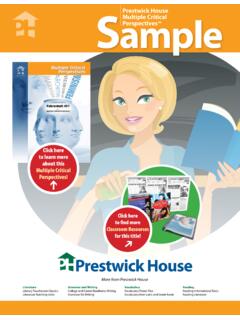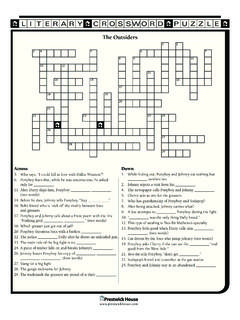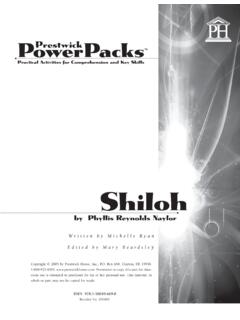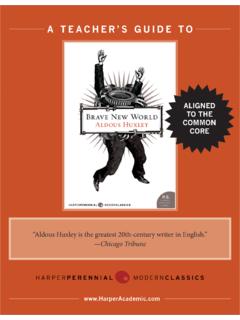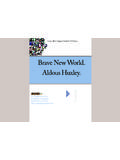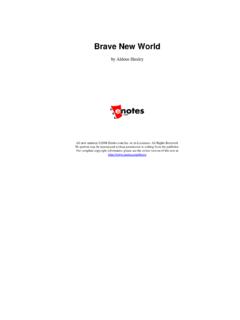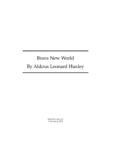Transcription of Brave New World - Multiple Critical Perspective
1 Box 658, Clayton, DE Teaching Aldous Huxley s from Multiple Critical PerspectivesBrave New World Prestwick HousePrestwick HouseItem No. 302318 Teaching Aldous Huxley s from Multiple Critical PerspectivesBrave New World Click here to learn more about this Multiple CriticalPerspectives! Click here to find more Classroom Resources for this title! SamplePrestwick HouseMultiple Critical Perspectives LiteratureLiterary Touchstone ClassicsLiterature Teaching UnitsGrammar and WritingCollege and Career Readiness: WritingGrammar for WritingVocabularyVocabulary Power PlusVocabulary from Latin and Greek RootsReadingReading Informational TextsReading LiteratureMore from Prestwick HouseBrave New World Teaching Aldous Huxley's from Multiple Critical Perspectivesby Douglas Grudzina Multiple Critical Perspectives 6 Pr e s t w i c k Ho u s e, in Critical PerspectivesBrave New WorldGeneral Introduction to the WorkDystopian or Anti-Utopian NovelBr a v e Ne w wo r l d i s a dystopian or anti-utopian novel.
2 A dystopian novel is a type of social science fiction typically set in the future (2540 or, AF 632, since the new standard for the measurement of time in the novel is based on Henry Ford s development of mass production for making automobiles). The purpose of the dystopian novel is to satirize current social and geo-political ideas (rampant mate-rialism, a post-WW I desire for law and order, and social stability ) by creating a World that exaggerates the fulfillment of those desires or the eradication of those ills. Hence, the theme of many dystopian novels can be stated: be careful what you wish for or if we stay on this path, here s where we ll end up.
3 Dystopian novels typically involve either a loner or outcast in the society (Bernard), or a newcomer (John Savage) whose inability to conform to the social norms, regardless of how perfect they may seem to the majority of the population (lax sexual mores, rampant drug use, and lack of any desire for real learning and knowledge), forces a confrontation with authorities and ultimately leads to expulsion from society, criminal charges, injury, or death. (John s inability to conform to the rules of society, as well as his rejection by his community of birth the Reservation force him to attempt to lead a new life, only to further his isolation and ultimately bring about his suicide.)
4 Bernard finds himself exiled.) The protagonist in the dystopian novel usually causes members of the society at large to question their status quo, sometimes even converting them to his or her way of thinking (John forges a strong friendship with Helmholtz Watson and falls in love with Lenina, both of whom are only slightly able to see the World from John s point of view), but, most often, dystopian novels do not have a happy end-ing (John commits suicide, Bernard and Helmholtz are banished from the World State, and the World State remains as it has been with no apparent change). Pr e s t w i c k Ho u s e, in c. 11 Multiple Critical PerspectivesBrave New WorldNotes on New HistoricismA c o m m o n t e n d e n c y i n t H e s t u d y of literature written in, and/or set in, a past or foreign culture is to assume a direct comparison between the culture as presented in the text and as it really was/is.
5 New Historicism asserts that such a comparison is impossible for two basic reasons. First, the truth of a foreign or past culture can never be known as established and unchangeable. At best, any understanding of the truth is a matter of interpretation on the parts of both the writer and the reader. This is most blatantly evident in the fact that the los-ers of history hardly ever get heard. The culture that is dominated by another is often lost to history because it is the powerful who have the resources to record that history. Even in recent past events, who really knows both sides of the story?
6 Who really knows the whole of the Nazi story? Or the Iraqi story? New Historicists argue that these unknown histories are just as significant as the histories of the dominant culture of power and should be included in any World view. Since they often contradict traditional ( , the winner s) his-tory, there is no way to really know the absolute truth. Second, while the text under consideration does indeed reflect the culture in which it was written (and to some degree in which it is set), it also participates in the culture in which it is written. In other words, its very existence changes the culture it reflects.
7 To New Historicists, literature and culture are born of one another. For example, although Harper Lee s To Kill a Mockingbird certainly reflected the culture of the South during the mid-20th century, it also became a tool to raise awareness of, and change certain elements of, that Historicism Appliedto Brave New World Pr e s t w i c k Ho u s e, in c. 15 Multiple Critical PerspectivesBrave New WorldActivity OneExamining the Text for Clues to the Political, Social, and Economic Situation in Europe After World War I1. Copy and distribute the handout: Brave New World : New Historicism Activity One Divide the class into five groups (or a number of groups divisible by five) and assign each (or allow each to choose, so long as all five of the issues are covered) one of the following: genetic engineering/eugenics technology economics politics/rise of dictators politics/formation and re-formation of countries3.
8 Have each group peruse the timeline and note events relevant to its Then have each group peruse the book and note anything (characters, names, facts in exposition, setting details, etc.) that are most likely references to that group s Have each group report back to the As a class, discuss the extent to which Huxley s World State is a reflection of or a reaction to the social, economic, and political climate in which he wrote the book. Pr e s t w i c k Ho u s e, in c. 27 Multiple Critical PerspectivesBrave New WorldNotes on the Psychoanalytic TheoryTH e t e r m s P s y cH o l o g i c a l, o r P s y cH o a n a l y t i c a l, or Freudian Theory seem to encompass essentially two almost contradictory Critical theories.
9 The first focuses on the text itself, with no regard to outside influences; the second focuses on the author of the text. According to the first view, reading and interpretation are limited to the work itself. One will understand the work by examining conflicts, characters, dream sequences, and symbols. In this way, the psychoanalytic theory of literature is similar to the Formalist approach. One will further understand that a character s outward behavior might conflict with inner desires, or might reflect as-yet-undiscovered inner areas of study/points of criticism of the first view: There are strong Oedipal connotations in this theory: the son s desire for his mother, the father s envy of the son and rivalry for the mother s attention, the daughter s desire for her father, the mother s envy of the daughter and rivalry for the father s attention.
10 Of course, these all operate on a subconscious level to avoid breaking a serious social more. There is an emphasis on the meaning of dreams. This is because psychoanalytic theory asserts that it is in dreams that a per-son s subconscious desires are revealed. What a person cannot express or do because of social rules will be expressed and accomplished in dreams, where there are no social rules. Most of the time, people are not even aware what it is they secretly desire until their subconscious goes unchecked in CriticismApplied to Brave New World32 Pr e s t w i c k Ho u s e, in Critical PerspectivesBrave New WorldActivity OneExamining the Novel for Evidence of Huxley s Views on Women and Marriage1.
